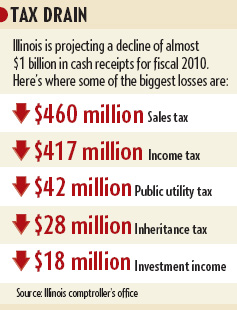Illinois Enters A State Of Insolvency….This Is One Scary Report
Posted By thestatedtruth.com on January 22, 2010
By Paul Merrion, Greg Hinz and Steven R. Strahler
Â
Jan. 18, 2010
While it appears unlikely or even impossible for a state to hide out from creditors in Bankruptcy Court, Illinois appears to meet classic definitions of insolvency: Its liabilities far exceed its assets, and it’s not generating enough cash to pay its bills. Private companies in similar circumstances often shut down or file for bankruptcy protection.”I would describe bankruptcy as the inability to pay one’s bills,” says Jim Nowlan, senior fellow at the University of Illinois’ Institute of Government and Public Affairs. “We’re close to de facto bankruptcy, if not de jure bankruptcy.”
Legal experts say the protections of the federal bankruptcy code are available to cities and counties but not states.
As a result, fiscal paralysis is spreading through state government. Unpaid bills to suppliers are piling up. State employees, even legislators, are forced to pay their medical bills upfront because some doctors are tired of waiting to be paid by the state. The University of Illinois, owed $400 million, recently instituted furloughs, and there are fears it may not make payroll in March if the shortfall continues.
Â
Without quick corrective action or a sharp economic upturn, Illinois is headed toward a governmental collapse. At some point, unpaid vendors will stop bidding on state contracts, investors will refuse to buy Illinois bonds and state employees will get paid in scrip, as California did last year.”The crisis will come when you see state institutions shutting down because they can’t pay their employees,” says David Merriman, head of the economics department at the University of Illinois at Chicago.
A record $5.1 billion in state bills was past due at yearend, almost doubling to 92 days from 48 days a year earlier the average amount of time it takes the state to pay vendors such as doctors, hospitals, non-profit service providers and other contractors.
State tax receipts from July through December last year were running more than $1 billion behind 2008, including a $460-million plunge in sales taxes and a $349-million drop in personal income taxes. Even with a 22% increase in money from the federal government, thanks largely to the stimulus program, total state revenues were down 2.1%, or $284 million, from the previous year.
In addition to its day-to-day budget, Illinois faces rising pension expenses in coming years. Lawmakers have skimped on required contributions to employee pension funds and even borrowed to make those smaller payments. Unfunded liabilities and pension debt are projected to reach $95 billion by June 30. The state must contribute $5.4 billion to the pension funds next year, and more than $10 billion a year in the future. Required contributions will soon start increasing dramatically because the state has repeatedly pushed back a payment schedule enacted in 1995 to set aside enough to cover 90% of its pension obligations by 2045, up from 43% today, one of the worst unfunded liabilities in the nation.
The sharp rise in pension payments is the biggest factor pushing Illinois toward what a legislative task force last November called “a ‘tipping point’ beyond which it will be impossible to reverse the fiscal slide into bankruptcy.” The little-noticed report on the state’s pension problems warned that “the radical cost-cutting and huge tax increases necessary to pay all the deferred costs from the past would become so large that many businesses and individuals would be driven out of Illinois, thereby magnifying the vicious cycle of contracting state services, increasing taxes, and loss of the state’s tax base.”
While the Illinois Constitution protects vested pension benefits, that promise, like all the state’s obligations, is only as good as its ability to pay. The Civic Federation warned lawmakers last fall that “there is mounting evidence that a judge could find the state is already insolvent. If the state is found to be insolvent under the classical cash-flow definition of insolvency, which is ‘the inability to pay debts as they come due,’ it is not only the pension rights of non-vested employees that will be in jeopardy. All the obligations of the state, whether vested or not, will be competing for funding with the other essential responsibilities of state government. Even vested pension rights are jeopardized when a government is insolvent.”
©2010 by Crain Communications Inc.
Printed from ChicagoBusiness.com


Comments